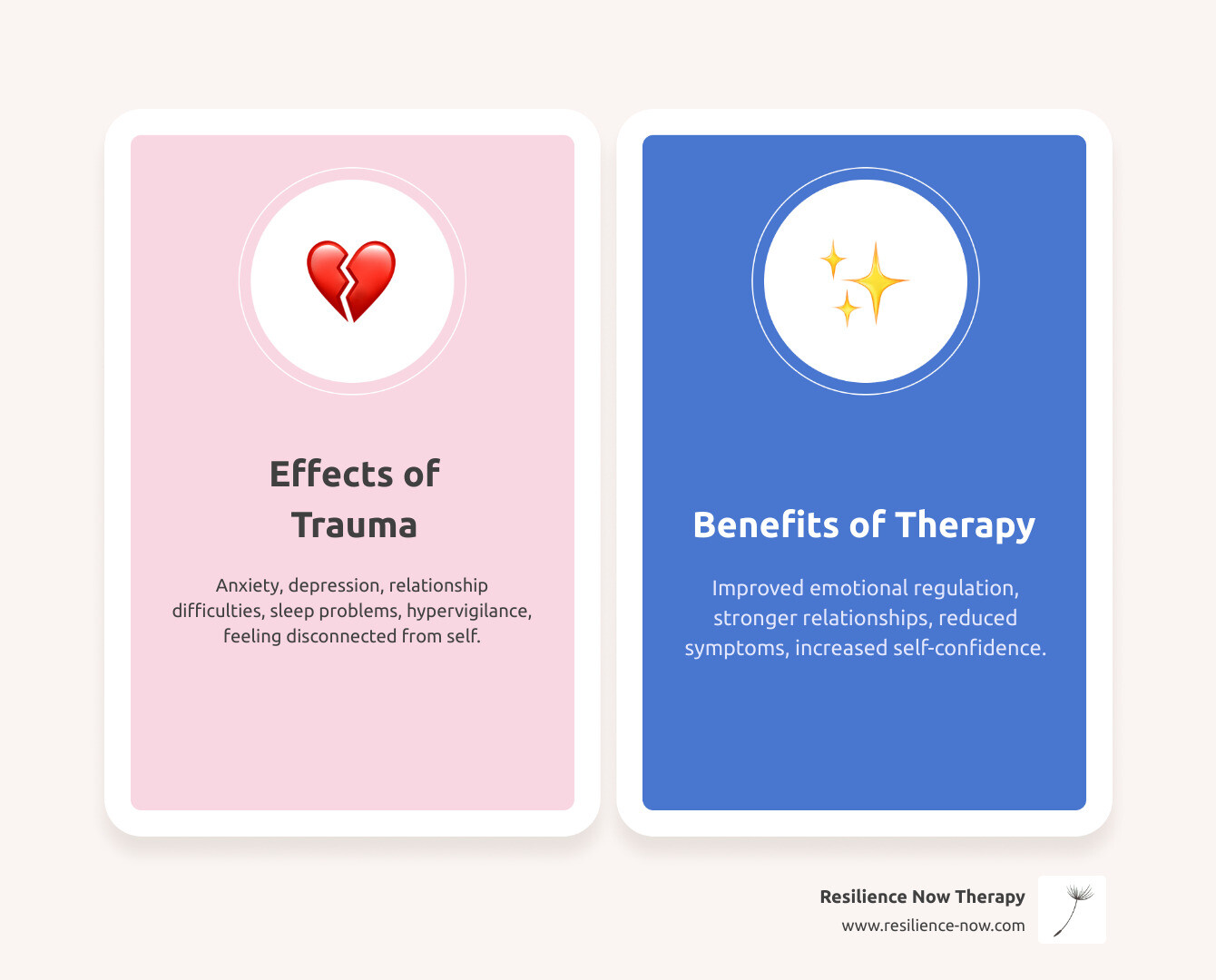Women's Trauma Therapy in Calgary: Your Path to Healing and Recovery

Finding Hope and Healing After Past Trauma in Calgary
If you're a woman carrying the invisible weight of past trauma, you're not alone. The racing thoughts, hypervigilance, and feeling overwhelmed while disconnected from yourself and others are real experiences that deserve compassionate, professional support. Through specialized women's trauma therapy Alberta residents trust, healing isn't just possible—it's within your reach.
I'm Vivienne Livingstone, a Licensed Therapist specializing in helping women overcome mental health challenges through evidence based treatment at Resilience Counselling and Consulting in Calgary. I've dedicated my career to helping women break free from the grip of past experiences and reclaim their life. My integrative approach combines evidence-based therapies with a deep understanding of how past trauma uniquely affects women, creating a safe space where genuine healing can unfold.
Understanding How Past Trauma Affects Women's Mental Health
Trauma isn’t defined by a single event — it’s about how overwhelming experiences leave lasting emotional imprints on your mind, body, and spirit, fundamentally altering how you perceive yourself, your relationships, and your sense of safety in the world. Women often experience trauma in distinct ways due to societal expectations and the unique challenges we face, and certain types affect us disproportionately—not because of weakness, but due to the realities of our lived experiences.
When left untreated, past trauma can significantly impact your mental health, leading to anxiety, depression, post traumatic stress disorder, and persistent feelings of low self esteem. These mental health challenges create a ripple effect that touches every aspect of daily life, from your ability to manage stress effectively to maintaining healthy relationships with others.
Common Trauma Experiences I Address Through Trauma Informed Care
In my Calgary practice, I support women healing from various past experiences, both in Calgary and online across Alberta, using trauma informed care principles, including:
Childhood trauma and abuse that continues influencing adult relationships and self-perception, often creating deep-seated negative beliefs that affect how you connect with others and view your true self.
Sexual assault and intimate partner violence that can shatter your fundamental sense of safety and trust, making it difficult to feel secure in relationships or even in your own body, often leading to body image concerns and relationship issues.
Medical trauma including difficult births, invasive procedures, or unexpected health diagnoses that can leave you feeling powerless and disconnected from your body, sometimes contributing to anxiety and depression.
Workplace trauma from harassment, discrimination, or toxic environments that erode your confidence and sense of professional competence, creating unique challenges in your career.
Intergenerational trauma passed down through families and communities, carrying forward patterns of pain and survival strategies that no longer serve your well being.
Complex trauma from prolonged exposure to harmful situations that can create persistent feelings of unsafety, hypervigilance, and difficulty managing daily life responsibilities.
These experiences often manifest in confusing and overwhelming ways. You might struggle with anxiety that seems to appear from nowhere, feel emotionally numb or overly reactive, experience nightmares or intrusive memories, or feel fundamentally disconnected from your emotions and body.
The Reality for Women Facing Mental Health Challenges
Many women I work with in Calgary appear successful and put-together externally while struggling internally with mental health challenges stemming from past trauma. You might excel in your career—perhaps as a businesswoman or maybe you are a nurse, teacher, social worker, or other helping professional—maintaining responsibilities and supporting others while quietly battling racing thoughts, self doubt, and emotional exhaustion.
This pattern reflects unique challenges particularly common among women in helping professions who often put others' needs before their own needs. The very qualities that make you effective—empathy, dedication, and managing multiple responsibilities—can also make you vulnerable to burnout and secondary trauma, affecting your overall well being.
When Success Masks Internal Struggle and Women's Issues
If you're reading this, you might recognize yourself as someone who faces these women's issues while navigating life's challenges:
- Appears confident and capable while internally questioning every decision due to low self esteem
- Excels professionally but struggles with imposter syndrome and self doubt
- Takes care of everyone else while neglecting your own emotional needs and mental health
- Maintains perfectionist standards influenced by societal expectations that leave you exhausted
- Feels stuck despite external achievements and recognition, unable to cope with underlying pain
- Struggles with body image and self acceptance while maintaining appearances
These patterns often develop as survival strategies but can become exhausting cycles that prevent you from addressing your own healing needs. The constant pressure to maintain appearances while struggling internally can intensify feelings of isolation, shame, and grief and loss around your authentic self.

The Ripple Effects of Unaddressed Mental Health Challenges
When past trauma remains untreated, its effects create mental health challenges that ripple through every area of daily life in ways that are initially difficult to recognize. Unaddressed trauma significantly impacts mental health, potentially leading to anxiety, depression, and post traumatic stress disorder. These mental health challenges can make daily life feel like an uphill battle, affecting your ability to function at work, maintain healthy relationships, and care for your own needs.
Over time, past trauma can erode self esteem and contribute to negative beliefs about yourself and the world. You may find yourself feeling stuck, unable to move forward despite your best efforts to cope. Relationships become strained as you struggle to trust others or establish healthy boundaries, and the stress of carrying unprocessed emotional wounds can manifest in physical symptoms affecting your overall well being.
Without proper support, you might feel overwhelmed by anxiety, struggle with depression symptoms, and find it increasingly difficult to manage stress in your daily life. The therapeutic process offers hope—evidence based treatment approaches can help you gain insight into these patterns and develop effective coping strategies.
My Trauma-Informed Approach to Mental Health in Calgary
At Resilience Counselling and Consulting, I understand that healing happens differently for every woman facing mental health challenges. My personalized, integrative approach combines multiple evidence-based therapies to address complex trauma using trauma informed care principles. My practice prioritizes your safety, choice, and empowerment throughout the healing process.
Core Principles Guiding My Work as Your Therapist
Safety: Creating both physical and emotional security in our therapeutic relationship, ensuring you feel protected and supported as we navigate life's challenges together.
Trustworthiness: Maintaining clear boundaries and providing consistent, reliable support that you can depend on as a therapist who understands the unique challenges women face.
Collaboration: Working with you as a true partner in addressing your mental health challenges, respecting your expertise about your own experience while offering professional guidance.
Empowerment: Recognizing and building upon your inherent strengths, helping you rediscover your resilience and capacity for growth despite past experiences.
Choice: Respecting your autonomy and providing therapy options throughout treatment, ensuring you always feel in control of your healing process.
This trauma informed care approach ensures you feel seen, heard, and empowered throughout your unique journey. Rather than feeling re-traumatized or powerless, you'll experience a therapeutic relationship that supports your growth and recovery at every step.
Evidence-Based Treatment Options I Offer
My specialized training allows me to offer several evidence-based treatment approaches that have been scientifically proven effective for women healing from past trauma and managing mental health challenges. Each method addresses different aspects of recovery, and I'll work with you as your therapist to determine which approaches best fit your unique needs and goals.
EMDR Therapy: Transforming How You Process Past Experiences
EMDR therapy is one of the most well-researched and effective approaches for addressing past trauma and mental health challenges. During EMDR therapy sessions, you'll process distressing memories while engaging in bilateral stimulation—typically following a light with your eyes, though I also use taps or sounds when preferred.
Think of your brain as having a natural processing system for emotions and memories. Past trauma can disrupt this system, leaving painful memories "stuck" in a raw, unprocessed state that continues affecting your mental health. EMDR therapy helps your brain complete this natural processing, allowing traumatic memories to lose their emotional intensity and integrate more peacefully into your life experience.
EMDR therapy is particularly effective for addressing:
- Post traumatic stress disorder symptoms and flashbacks from past experiences
- Anxiety and panic attacks that seem to come from nowhere, affecting daily life
- Disturbing memories and nightmares that disrupt your sleep and well being
- Negative beliefs about yourself stemming from past experiences
- Emotional reactivity and feeling overwhelmed by stress in daily life
Accelerated Resolution Therapy (ART): Rapid Relief from Mental Health Challenges
As a Master ART Therapist, I'm specially trained in this innovative approach that can produce remarkable results addressing mental health challenges in a relatively short timeframe—often within one to five sessions. ART combines eye movements with image rescripting and guided visualization to help you process past trauma and emotional wounds.
One of the most appreciated aspects of ART is that it allows you to experience significant relief without having to discuss the details of what happened. You can maintain your privacy about specific past experiences while still achieving profound healing and improved mental health.
Internal Family Systems Informed Therapy: Healing Your Relationship with Yourself
This approach recognizes that we all have different "parts" of ourselves—like the part that tries to keep you safe by avoiding risks, the part that carries emotional wounds from past experiences, or the part that pushes you toward perfection due to societal expectations. This therapy helps you understand and heal these different aspects of yourself, bringing more harmony and self compassion to your internal world.
Through this therapeutic process, you'll learn to:
- Recognize and understand your different internal parts affected by past trauma
- Heal wounded parts with self compassion rather than criticism
- Strengthen your core Self-leadership and authentic true self
- Develop internal cooperation rather than conflict between parts, improving self esteem

Trauma-Informed Stabilization Treatment: Building Your Foundation for Mental Health
In Trauma-Informed Stabilization Treatment (TIST), building internal safety and stability is the first step before addressing traumatic memories. This evidence-based approach helps you identify protective parts, develop emotional regulation skills, and increase your capacity to stay present with difficult sensations. By strengthening this foundation, TIST supports lasting healing and more effective management of trauma-related symptoms.
This treatment emphasizes:
- Identifying and differentiating trauma-related parts—particularly those that carry intense emotion, shame, fear, or protective strategies like avoidance, numbing, or self-criticism
- Strengthening the mindful self (your observing adult) to respond with curiosity and compassion toward overwhelmed or reactive parts
- Using somatic mindfulness and grounding to increase awareness of body sensations and to stay anchored in the present when parts are activated
- Creating internal safety by building trust with protector parts and reducing the need for extreme coping behaviours
Observed and Experiential Integration Therapy: Reconnecting with Your Body and Emotions
Observed and Experiential Integration (OEI) is a bilateral therapy approach that helps process trauma by accessing the brain’s innate ability to heal through the eyes and body. By using specific eye positions and noticing subtle shifts in sensation, OEI supports the integration of fragmented experiences—especially when trauma has led to feeling emotionally numb, disconnected from the body, or struggling with issues like body image or self-worth. This gentle, nonverbal method allows deep emotional material to surface and resolve without the need to relive it in detail.
Through this therapeutic process, you'll:
- Reconnect with your body's wisdom and natural healing capacity
- Process stored emotional wounds in a gentle, manageable way
- Develop greater self-awareness and present-moment presence in daily life
- Cultivate resilience by integrating previously disconnected emotional and somatic experiences, allowing for more adaptive responses to stress and greater emotional flexibility in daily life.
The Mind-Body Connection in Mental Health Recovery
Past trauma doesn't just affect your thoughts and emotions—it is stored in your body and nervous system. That's why true healing from mental health challenges often requires approaches that address these physical manifestations. My approach as your therapist incorporates a polyvagal understanding of how past trauma affects your nervous system, including those fight, flight, freeze, or fawn responses that can feel automatic and overwhelming when you're trying to manage stress.
Through our work together, you'll learn to:
- Recognize your nervous system's responses to perceived threats in daily life
- Develop practical tools for self-regulation and calming when feeling overwhelmed
- Release tension and trapped energy stored in your body from past experiences
- Reconnect with your body as a source of wisdom and strength, improving body image and self acceptance
I also integrate polyvagal theory and mindfulness-based techniques to help you cultivate present-moment awareness and develop a more compassionate relationship with your body and emotions, supporting your overall mental health and well being.
What to Expect from Your Unique Journey with Mental Health Recovery
Beginning therapy for mental health challenges stemming from past trauma is a courageous step, and it's natural to have questions about what the therapeutic process will look like. Each woman's healing is a unique journey, shaped by her past experiences, goals, and pace of recovery. While healing unfolds over time, you can expect to notice positive changes that enhance your daily life and overall well being.
The Initial Process with Your Therapist
I offer a free 15-minute phone consultation where we can discuss your mental health challenges and determine if my approach is a good fit for you. This conversation allows you to ask questions about my methods as a therapist and get a sense of my therapeutic style before committing to treatment.
If we decide to work together, your first appointment will be a 50-minute intake session. This is a guided conversation where I'll get to know you, understand what mental health challenges you'd like to address, and learn about past experiences affecting your well being. We'll discuss your goals, your history, and develop a personalized treatment plan tailored to your specific needs.
Ongoing Treatment Structure for Managing Mental Health Challenges
I typically schedule sessions on a weekly or biweekly basis, depending on your needs and goals for addressing mental health challenges. Consistent attendance is particularly important when processing past trauma, as healing often requires sustained focus and support from your therapist.
To support lasting change in your mental health and daily life, I may offer between-session practices, reflections, or homework assignments that help you apply insights and coping strategies in your everyday life. These exercises are designed to reinforce our therapeutic process and accelerate your progress toward improved well being.
Expected Outcomes and Benefits for Your Mental Health
Many women begin to notice improvements in their mental health challenges and ability to cope within the first few months of treatment. While everyone's unique journey differs, common benefits include:
Relief from Mental Health Symptoms: Significant reduction in the intensity and frequency of anxiety, depression, and post traumatic stress disorder symptoms. You'll find yourself feeling more present and grounded in daily life, better able to manage stress.
Enhanced Emotional Regulation: Development of healthy coping strategies for managing intense emotions, leading to greater emotional balance and stability. Instead of feeling overwhelmed or emotionally numb, you'll learn to navigate your feelings with greater ease and confidence.
Improved Relationships: As you heal emotional wounds and develop healthy boundaries, you'll find it easier to build and maintain meaningful connections with others. Trust and intimacy become more accessible as you learn to trust your true self and others, addressing relationship issues.
Increased Self Esteem and Self Worth: Processing past experiences allows you to let go of harsh self-criticism and perfectionism. You'll reconnect with your inner strength and develop a more compassionate, realistic relationship with yourself, improving self acceptance.
Body Reconnection and Improved Body Image: Through integrated mind-body techniques, you'll safely reconnect with your body's wisdom and reclaim your sense of wholeness. This includes learning to listen to your body's signals and honor your physical and emotional needs.
Long-term Resilience for Life's Challenges: You'll gain powerful coping skills and deeper self-understanding that create a solid foundation for navigating future challenges with greater strength and adaptability, supporting your ongoing mental health.
Freedom from Feeling Stuck: Many women report feeling unstuck and able to move forward in life after addressing core issues through trauma informed care.

EMDR Therapy Intensives in Calgary
For women who prefer a more concentrated approach to addressing mental health challenges, I offer EMDR therapy intensive sessions. These longer, more focused sessions can accelerate the healing process and provide rapid relief from symptoms related to past trauma.
EMDR therapy intensive sessions are particularly beneficial for:
- Processing specific past experiences that feel stuck
- Achieving breakthrough moments in your mental health recovery
- Women with busy schedules who prefer concentrated treatment
- Those who want to make significant progress addressing anxiety and depression in a shorter timeframe
During an EMDR therapy intensive, we'll work together for extended periods, allowing for deeper processing and integration of past experiences. This format often leads to profound shifts and lasting improvements in mental health.
Building Your Support Network for Mental Health
While our therapeutic relationship is central to addressing your mental health challenges, building a broader support network is also important for long-term recovery. As your therapist, I'll help you identify and strengthen connections with family, friends, and community resources that can support your ongoing growth and well being.
This might include:
- Developing healthy boundaries with existing relationships to protect your mental health
- Learning to communicate your own needs effectively and assertively
- Identifying people who can provide ongoing emotional support as you navigate life's challenges
- Connecting with Calgary community resources and activities that align with your values and support your well being
The Importance of Self-Care in Mental Health Recovery
Self-care isn't just about relaxation activities—it's about developing a sustainable relationship with yourself that supports your mental health and growth. Through our therapeutic process, you'll learn to:
- Recognize your own needs and honor them consistently, supporting your self worth
- Develop healthy routines that support your overall well being and daily life
- Practice self compassion when facing challenges and setbacks in your mental health journey
- Create healthy boundaries that protect your energy and peace of mind
- Engage in activities that bring you genuine joy and fulfillment, supporting your true self

Addressing Common Concerns About Mental Health Treatment
It's completely normal to have reservations about beginning therapy for mental health challenges related to past trauma. Many women worry about revisiting painful experiences or fear being judged for their past experiences. These concerns are valid, and I want to address them directly as your potential therapist.
"I should be able to handle these mental health challenges on my own" Seeking support for mental health challenges is a sign of strength, not weakness. Just as you wouldn't hesitate to see a doctor for a physical injury, healing from past trauma often requires professional support from a qualified therapist. You deserve compassionate, skilled assistance on your unique journey.
"I'm worried about being re-traumatized" My trauma informed care approach is specifically designed to prevent re-traumatization. We'll work at your pace, within your comfort zone, and you'll always have control over what we discuss and how we proceed in addressing your mental health challenges.
"I don't want to relive painful past experiences" Many of my therapeutic approaches, particularly ART, allow for significant healing without requiring detailed discussion of past experiences. You can experience relief and improved mental health while maintaining privacy about specific incidents.
"I'm concerned about the time commitment" While healing from mental health challenges takes time, many women notice improvements relatively quickly. We'll work together to develop a treatment plan that fits your schedule and goals. Remember that investing in your mental health is investing in every aspect of your life and well being.
Addressing Grief and Loss in Your Mental Health Journey
Many women I work with are also processing grief and loss—whether from the death of a loved one, the end of a relationship, or mourning the life they thought they'd have before past trauma changed their path. Grief and loss can significantly impact mental health and compound existing challenges like anxiety and depression.
Through individual therapy, I provide a supportive space to process grief and loss while addressing underlying mental health challenges. This integrated approach helps you heal from multiple sources of pain while building resilience for navigating life's challenges.
Practical Information for Calgary Mental Health Services
Scheduling and Accessibility for Mental Health Support
I offer both in-person sessions at my Calgary office and online therapy options for women throughout Alberta seeking mental health support. Online sessions provide the convenience and comfort of receiving support from your own home, while in-person sessions offer direct, face-to-face connection with your therapist. This flexibility ensures you can access trauma informed care regardless of your location or schedule constraints.
Investment in Your Mental Health and Well Being
The cost of therapy is an investment in your mental health, overall well being, and future happiness. I provide receipts that can be submitted to many employee benefit plans for potential reimbursement. I encourage you to check with your benefits provider about coverage for mental health services.
For specific pricing information and to discuss therapy options, please contact me directly. I'm committed to making mental health support accessible and will work with you to find a solution that fits your financial situation.
Taking the First Step Toward Mental Health Recovery
If you're ready to break free from the weight of past experiences and step into a future filled with resilience and well being, I'm here to support you every step of the way as your therapist. Healing from mental health challenges is possible, and you have the strength within you to pursue it.
The very fact that you're reading this information shows your courage and readiness to address your mental health challenges. That's a powerful first step, and I want you to know that you don't have to walk alongside these challenges alone.
Your unique journey toward healing and mental health recovery can begin today. When you're ready to reclaim your life and discover the resilience that lies within you, I'm here to help guide you through the therapeutic process with compassion, expertise, and unwavering support.
To schedule your free 15-minute consultation or to learn more about how trauma informed care can support your mental health and help you navigate life's challenges, please contact Resilience Counselling and Consulting. Together, we can work toward a future where you feel empowered, peaceful, and fully alive in your true self.
Remember: you deserve to heal from past trauma, you deserve support for your mental health challenges, and you deserve to live a life free from the shadows of past experiences. Your healing begins with a single step toward better mental health, and I'm honored to walk alongside you as you reclaim your strength, self worth, and well being in Calgary and beyond.
